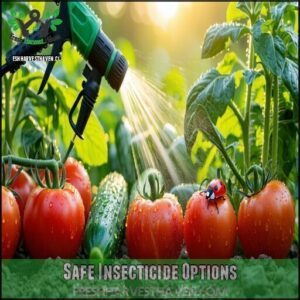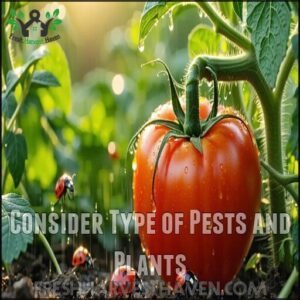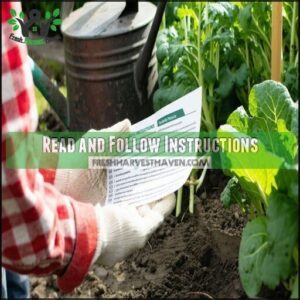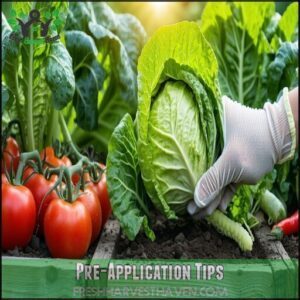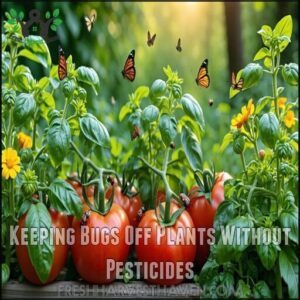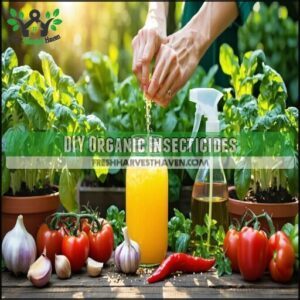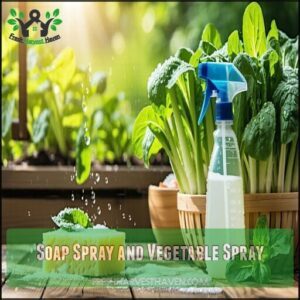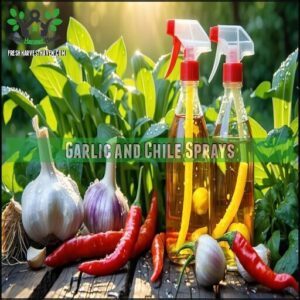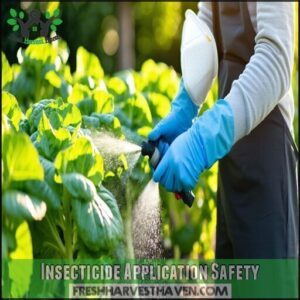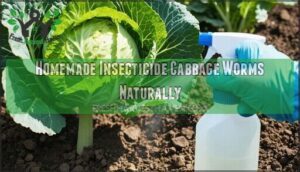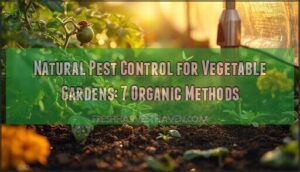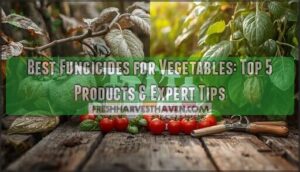This site is supported by our readers. We may earn a commission, at no cost to you, if you purchase through links.
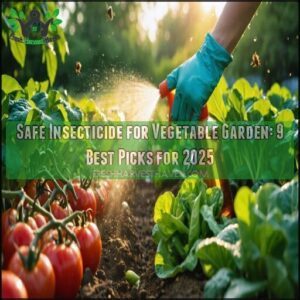 You’ll find several safe insecticide options for your vegetable garden that won’t turn dinner into a chemistry experiment.
You’ll find several safe insecticide options for your vegetable garden that won’t turn dinner into a chemistry experiment.
Neem oil works wonders against aphids and whiteflies while remaining food-safe. Bacillus thuringiensis (Bt) specifically targets caterpillars without harming beneficial insects.
For a DIY approach, try soap sprays or garlic oil—they’re effective and you’ve likely got the ingredients in your kitchen already.
Always apply any safe insecticide for vegetable garden use in early morning or evening to protect pollinators. Remember that even organic options require careful application—timing can make the difference between a bountiful harvest and inviting unwanted dinner guests.
Table Of Contents
- Key Takeaways
- Safe Insecticide Options
- Choosing Right Insecticide
- Top 9 Safe Insecticides
- 1. Bonide Neem Oil Organic Insecticide Ready-to-Use
- 2. Natria Neem Oil Pest Control
- 3. BioAdvanced Fruit Veggie Insect Control
- 4. Monterey Spinosad Garden Insect Spray
- 5. Sevin 5% Dust 3 Pack
- 6. Sevin Ready to Spray Insect Killer
- 7. Bonide Systemic Insect Control Granules
- 8. Southern Ag Natural Pyrethrin Concentrate
- 9. Ortho 3 in 1 Garden Solution
- Natural Pest Control Methods
- Insecticide Application Safety
- Frequently Asked Questions (FAQs)
- What insecticides are safe for vegetable gardens?
- Is sevin safe for vegetable garden?
- What can I spray on my vegetable garden for bugs?
- What is a natural pesticide for vegetable gardens?
- When is the best time to apply insecticides?
- How long before harvest should insecticides stop?
- Are pollinators affected by organic insecticides?
- Can insecticides harm soil microorganisms?
- How to store unused insecticide solutions safely?
- Conclusion
Key Takeaways
- You’ll find organic options like neem oil and Bacillus thuringiensis (Bt) highly effective while remaining food-safe—neem oil targets aphids and whiteflies while Bt specifically eliminates caterpillars without harming beneficial insects.
- You can create effective DIY insecticides using household ingredients like soap sprays (2 tablespoons liquid dish soap in 1 gallon of water) or garlic oil mixtures that repel pests while being safe for edible plants.
- You should always apply insecticides during early morning or evening to protect pollinators, wear protective gear (gloves, long sleeves, mask), and thoroughly wash your hands after application to ensure both garden and personal safety.
- You’ll reduce chemical residues on your harvest by properly washing produce under running water, soaking in baking soda solution (1 tablespoon per gallon for 10-15 minutes), or using a 2% salt water wash for stubborn residues.
Safe Insecticide Options
You want to protect your vegetable garden without harming the environment or beneficial insects, and safe insecticides can help you do just that.
From organic options like neem oil to DIY solutions, these choices guarantee effective pest control while keeping your plants and produce safe.
Organic Vs Chemical Insecticides
Choosing between organic vs chemical insecticides boils down to safety and environmental impact.
Organic options, like neem oil, are eco-friendly and safer for human health, while chemical ones often deliver faster results but pose long-term effects.
For vegetable garden pest control, consider:
- Organic pest control reduces residues.
- Cost analysis favors organic for sustainability.
- Safer application methods.
- Chemical insecticides risk beneficial insects.
- Organic insecticide gardens promote biodiversity.
Healthy soil practices enhance plant immunity, which is crucial for a healthy garden and supports the use of organic pest control methods.
Botanical Insecticides
Botanical insecticides offer effective, natural pest control for vegetable gardens.
Extracted from plants, these safe insecticides, like neem oil, pyrethrin, and spinosad, target pests without harming humans or pets.
Neem oil suffocates pests, pyrethrin disrupts nervous systems, and spinosad is ideal for organic pest control.
Many gardeners source neem oil products for their gardens.
Their botanical efficacy guarantees safer vegetable garden pest control, making them excellent alternatives to synthetic chemicals, with natural pest control being a key benefit.
Natural and DIY Pest Control Methods
Botanical insecticides are great, but sometimes you want a hands-on approach.
Natural pest control methods, like companion planting or attracting beneficial insects, keep bugs at bay without chemicals.
DIY recipes, such as garlic or soap sprays, offer safe alternatives for plant health.
Try a homemade insecticide or vegetable bug killer for a safe garden spray that doubles as a natural pest repellent.
Choosing Right Insecticide
You’ve got to match the insecticide to the specific pests and plants in your garden to see real results.
Always read the label carefully, so you know how to apply it safely and effectively.
Consider Type of Pests and Plants
Identifying your target pest is step one—different bugs need different solutions.
Caterpillars? Try a vegetable bug killer. Aphids? Neem oil works wonders.
Consider plant vulnerability and pest lifecycles to act at the right time.
Use safe garden sprays to protect beneficial insects. Resistance management is key, so rotate products for effective vegetable insect control and natural pest control.
Read and Follow Instructions
When selecting an insecticide, always read the label—it’s your cheat sheet for insecticide safety.
Follow these steps:
- Check dosage accuracy to avoid overuse.
- Mixing specifics matter; dilute as directed.
- Timing matters—apply during recommended hours.
- Wear protective gear like gloves and masks.
- Follow storage guidelines to keep chemicals safe and effective.
Insecticide instructions aren’t optional!
Pre-Application Tips
Before applying a vegetable safe insecticide, prep your garden for success.
Remove infected plants to stop disease spread. Use organic soil and rotate crops annually to keep pests guessing.
Raised garden beds near your home add protection. Clean pruning tools and clear debris like dead plants.
To combat cabbage worms, consider using Bacillus thuringiensis (Bt). These steps boost insecticide safety, ensuring effective application and harvest safety.
Top 9 Safe Insecticides
You’ll find these nine insecticides effectively eliminate garden pests while preserving the health of your edible plants and beneficial insects.
Each product has been selected for its specific active ingredients and application methods that target common vegetable garden invaders without compromising your harvest’s safety, which helps to preserve the health of your plants.
1. Bonide Neem Oil Organic Insecticide Ready-to-Use
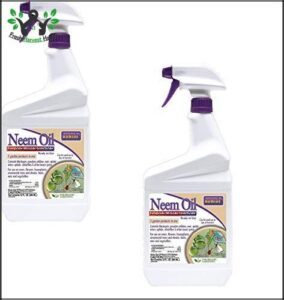
In the context of organic pest control, Bonide Neem Oil stands out as a versatile triple-threat.
This ready-to-use spray functions as a fungicide, miticide, and insecticide all in one bottle.
You’ll appreciate that it’s derived from neem seeds and approved for organic gardening, making it safe around family and pets.
It effectively kills insects at all life stages while preventing fungal diseases on your vegetables.
The convenient spray nozzle means no mixing required—just spray directly on your plants up to the day of harvest.
Best For: Gardeners seeking an organic, ready-to-use solution for controlling pests, mites, and fungal diseases on various plants, safe for use around people and pets.
- Acts as a 3-in-1 fungicide, miticide, and insecticide.
- Derived from neem seeds and approved for organic gardening.
- Ready-to-use spray with no mixing required.
- May require frequent application for severe infestations.
- Limited coverage compared to bulk concentrate options.
- Effectiveness can vary depending on environmental conditions.
2. Natria Neem Oil Pest Control
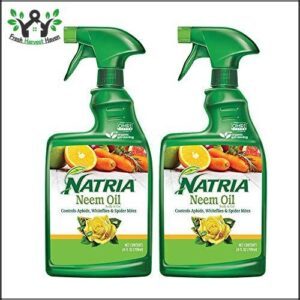
Looking for double-duty protection? Natria Neem Oil Pest Control offers OMRI-certified organic defense against multiple garden threats.
Here’s a short, engaging blockquote in the same tone as the content:
Neem oil: nature’s double-duty defender, protecting your garden organically while keeping harmful chemicals at bay.
This ready-to-use formula contains 0.9% clarified hydrophobic neem oil extract that effectively targets aphids, spider mites, whiteflies, and fruit flies while simultaneously combating black spot, rust, and powdery mildew.
You’ll appreciate that it’s safe for roses, flowers, fruits, and vegetables—even up to harvest day. For best results, apply every 7-14 days.
While it won’t harm beneficial insects when used properly, remember that "organic" doesn’t automatically mean safe for everyone.
Best For: Gardeners and farmers seeking an organic, all-in-one solution for pest and disease control that’s safe for a variety of plants, including roses, fruits, and vegetables.
- OMRI-certified organic and safe for use up to the day of harvest.
- Controls a wide range of pests and fungal diseases.
- Ready-to-use formula for convenience and ease of application.
- Requires reapplication every 7-14 days for effectiveness.
- Mixed effectiveness reported for controlling certain pests like mites.
- Not a general insecticide; only targets pests actively feeding on plants.
3. BioAdvanced Fruit Veggie Insect Control
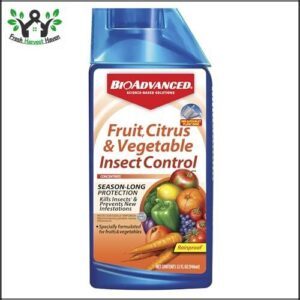
A versatile powerhouse for your garden, BioAdvanced Fruit Veggie Insect Control offers thorough protection for over 100 edible plants.
You’ll appreciate its one-application formula that provides season-long defense against Asian Citrus Psyllids, aphids, whiteflies, and more.
Once applied, it creates a rainproof systemic shield that won’t wash away.
It’s even safe to use just one day before harvest.
Remember that this product utilizes systemic root treatment for season-long protection.
Do check local regulations before purchasing, as it’s restricted in several states including Connecticut, Colorado, Maryland, Massachusetts, Maine, Vermont, and specific New York counties, to ensure compliance with regulations.
Best For: Gardeners looking for a rainproof, single-application pest control solution for over 100 edible plants, including fruits, vegetables, and citrus.
- Provides season-long pest control with one application.
- Rainproof formula ensures lasting protection.
- Safe to use up to one day before harvest.
- Restricted in several states and specific New York counties.
- Requires compliance with local regulations before use.
- Not suitable for organic gardening.
4. Monterey Spinosad Garden Insect Spray
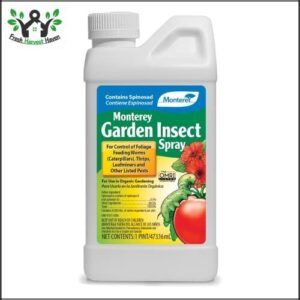
For those up against stubborn garden pests, Monterey Spinosad Garden Insect Spray offers a powerful organic solution.
Containing 0.5% spinosad derived from soil bacteria, this fast-acting formula paralyzes caterpillars, leafminers, thrips, and fire ants within 1-2 days while being gentle on beneficial insects.
You’ll appreciate its odorless application and versatility—simply mix 2 oz per gallon of water and spray uniformly on your vegetables, with the added benefit of harvesting just one day after treatment.
OMRI Listed for organic gardening, it’s a safe choice for your family’s food supply.
Best For: Gardeners seeking an organic, fast-acting, odorless solution to control a wide range of pests while being safe for people, pets, and beneficial insects.
- OMRI Listed for organic gardening and safe around people and pets.
- Fast-acting, killing pests within 1-2 days without unpleasant odors.
- Versatile application methods and effective against a broad range of pests.
- Toxic to bees, fish, and aquatic life; requires cautious application near waterways.
- Susceptible insects may remain visible for up to 3 days after spraying.
- Overuse may lead to insect resistance, requiring product rotation.
5. Sevin 5% Dust 3 Pack
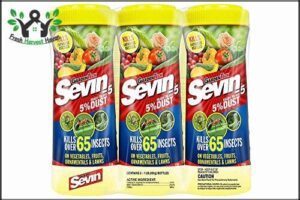
The Sevin 5% Dust 3 Pack offers powerful protection against over 65 insect species including Japanese beetles, armyworms, and earwigs.
You’ll appreciate that there’s no mixing required—simply apply a thin coating to leaf surfaces. This ready-to-use formula comes in convenient 1Lb shaker canisters, making application straightforward for both novice and experienced gardeners.
It’s safe for vegetables, fruits, ornamentals, and lawns, and doesn’t penetrate plant tissue.
Trusted by professionals for over 30 years, this insecticide breaks down easily in the environment while delivering effective pest control. The Sevin 5% Dust 3 Pack is a ready-to-use formula that provides powerful protection.
Best For: Home gardeners and professionals seeking a ready-to-use, effective solution for controlling a wide variety of outdoor insects.
- Ready-to-use formula with no mixing required.
- Safe for vegetables, fruits, ornamentals, and lawns.
- Trusted by professionals for over 30 years.
- Requires proper storage to maintain effectiveness.
- Application should follow strict local regulations.
- Limited to outdoor use; not safe for indoor pests.
6. Sevin Ready to Spray Insect Killer
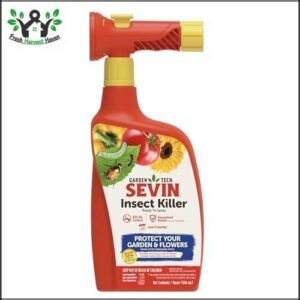
Sevin’s Ready to Spray Insect Killer offers gardeners a hassle-free solution for thorough pest control.
Containing 0.35% Zeta-Cypermethrin, this liquid formula effectively targets over 500 pests while being suitable for vegetable gardens.
Simply attach to your garden hose, spray evenly, and enjoy up to three months of protection.
For best results, apply when pests are visible and avoid spraying open blooms to protect pollinators.
Though the hose-end sprayer occasionally presents issues with water pressure, most users report remarkable results against grasshoppers, bag worms, and other common garden invaders, achieving effective pest control.
Best For: Home gardeners looking for an easy-to-use, effective pest control solution for vegetables, flowers, and outdoor plants.
- Kills over 500 pests and provides up to 3 months of protection.
- Easy application with a garden hose and no mixing required.
- Safe for use on lawns, vegetables, fruits, and flowers when used as directed.
- Hose-end sprayer may experience issues with low water pressure.
- Not suitable for application on blooming plants to protect pollinators.
- Requires careful handling due to moderately toxic active ingredient.
7. Bonide Systemic Insect Control Granules
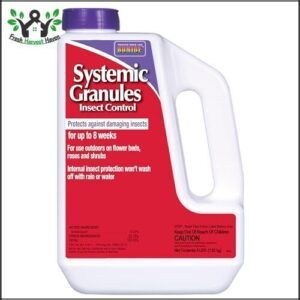
Many gardeners appreciate Bonide Systemic Insect Control Granules for their hassle-free application and impressive 8-week protection.
These odorless granules work efficiently on houseplants, flowers, roses, and containerized plants by being absorbed through the roots and distributed throughout the entire plant.
They’ll effectively eliminate pests like fungus gnats, mealybugs, whiteflies, thrips, and aphids without messy sprays.
However, note that these granules aren’t suitable for edible plants, including herbs, vegetables, or fruit-bearing plants.
Simply apply evenly to soil, mix thoroughly, water in, and reapply as needed to ensure 8-week protection and maintain a pest-free environment with odorless granules and a hassle-free application.
Best For: Gardeners who want mess-free, odorless pest protection for houseplants, flowers, and shrubs.
- Provides up to 8 weeks of hassle-free pest protection.
- Odor-free, spray-free, and easy to apply.
- Effectively targets pests like fungus gnats, aphids, and mealybugs.
- Not suitable for edible plants like herbs, vegetables, or fruits.
- Requires reapplication every 8 weeks for continued protection.
- Only works on non-edible plants, limiting its use in vegetable gardens.
8. Southern Ag Natural Pyrethrin Concentrate
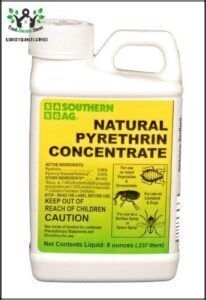
This powerful botanical insecticide, derived from chrysanthemum flowers, offers versatile protection for your vegetable garden.
Southern Ag Natural Pyrethrin Concentrate effectively controls a wide range of pests including aphids, whiteflies, beetles, and worms.
You’ll appreciate its biodegradable, fast-acting formula that can be used until harvest day with minimal residue concerns.
Mix 1 part concentrate to 9 parts water and apply with a sprayer. Remember to follow safety precautions—it’s toxic to bees and aquatic organisms.
For best results, use as needed or twice weekly, but only targets pests present during application.
Best For: Gardeners and pet owners looking for a natural, fast-acting insecticide for versatile use on plants, pets (excluding cats), and living spaces.
- Derived from natural chrysanthemum flowers and biodegradable.
- Effective against a wide range of pests on vegetables, ornamentals, and livestock.
- Can be used on edible plants until harvest day.
- Toxic to bees, aquatic organisms, and harmful if absorbed through the skin.
- Does not leave a residual effect, only kills pests during application.
- Not safe for use on cats and may cause allergic reactions with prolonged contact.
9. Ortho 3 in 1 Garden Solution
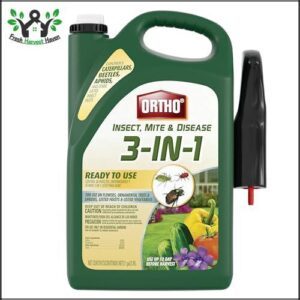
Ortho’s 3 in 1 Garden Solution offers triple-threat protection for your vegetable garden without the hassle of mixing chemicals.
This ready-to-use formula tackles a broad range of problems—from pesky aphids and Japanese beetles to fungal diseases like powdery mildew and black spot.
You’ll appreciate its versatility across vegetables, fruits, flowers, and ornamentals.
For maximum protection, plan to reapply every 7-10 days or after rainfall.
While effective against numerous pests, remember to follow the label instructions carefully and wear protective gear during application for your safety.
Best For: Gardeners looking for an easy-to-use solution to manage a variety of pests and fungal diseases across vegetables, fruits, flowers, and ornamental plants.
- Controls both pests and fungal diseases with one product.
- Ready-to-use formula requires no mixing.
- Versatile for use on various types of plants.
- Requires reapplication every 7-10 days or after rain.
- Protective gear needed during application.
- May require monitoring to assess effectiveness.
Natural Pest Control Methods
You’ll find effective alternatives to chemical insecticides by using the garden’s natural defense mechanisms and simple household ingredients.
Natural pest control methods harness beneficial insects, companion planting, and homemade solutions like soap sprays and garlic extracts to protect your vegetable garden while maintaining ecological balance.
Keeping Bugs Off Plants Without Pesticides
Before reaching for commercial products, you can keep your vegetable garden naturally pest-free.
Strong plant health forms your first line of defense, as pests typically target weaker plants.
Here are three organic garden pest control strategies that work wonders:
- Use companion planting by pairing tomatoes with basil or marigolds with cucumbers
- Attract beneficial insects like ladybugs and lacewings with flowering plants
- Keep your compost pile away from growing areas to reduce pest attraction
These strategies can help maintain a healthy and balanced garden ecosystem, ensuring your plants remain strong and resilient against pests.
DIY Organic Insecticides
While preventing bugs is ideal, sometimes you need DIY organic insecticides for your vegetable garden.
Creating your own nontoxic insecticide is surprisingly simple and effective. From tomato leaf sprays that kill aphids to potent garlic oil mixtures that repel pests, these homemade solutions use ingredients from your kitchen.
Consider purchasing organic insecticide supplies to simplify the mixing process. The all-in-one homemade spray combines several reader-submitted recipes for a safe yet powerful organic garden pest control option.
Soap Spray and Vegetable Spray
After exploring DIY organic options, let’s look at two simple but effective solutions for your garden.
Soap spray works wonders as a natural insecticide by disrupting cell membranes of soft-bodied pests, causing suffocation. Mix 2 tablespoons of liquid dish soap with 1 gallon of water for an effective solution.
For best results, apply weekly and thoroughly coat plants. Vegetable spray serves as a gentle, non-toxic alternative that acts as a natural surfactant for cleaning produce and deterring certain pests.
Garlic and Chile Sprays
While soap and vegetable oil sprays work well for soft-bodied pests, garlic and chile sprays pack an extra punch against stubborn garden invaders.
Your homemade garlic spray (2 pureed bulbs, 1 quart water, 1 teaspoon soap, ½ cup oil) effectively repels mites, wasps, and ants.
Similarly, chile spray combines 2 pureed peppers with the same solution, creating a potent yet vegetable-safe insecticide that most edible garden plants tolerate well.
Apply weekly for maximum pest specificity and spray effectiveness.
Insecticide Application Safety
You’ll need to protect yourself as carefully as you protect your plants when applying insecticides in your vegetable garden.
Always wear gloves, long sleeves, and a mask to minimize skin contact and inhalation.
Thoroughly wash your hands immediately after application to guarantee both garden safety and personal wellbeing.
Pre-Application Tips and Safety Precautions
Now that you’ve explored natural solutions, let’s prepare for safer chemical applications when needed.
Before applying any vegetable safe insecticide, proper Garden Hygiene is your first defense. Remove infected plants, implement Tool Sanitation by cleaning pruners, and refresh your soil preparation annually.
Fall is also a great time to practice garden pest control to reduce spring issues.
Always wear Protective Gear—gloves, long sleeves, and pants—when handling even petsafe insecticide. Timing Matters too; apply your safe bug spray at least 24 hours before rain for maximum effectiveness, considering maximum effectiveness.
Application Tips and Best Practices
For best results with your vegetable safe insecticide, apply during early morning or late evening when beneficial insects are less active.
Apply insecticides early morning or late evening to protect beneficial insects and maximize pest control effectiveness.
Calibrate your sprayer before each use to guarantee dosage precision.
Timing matters—treat at the first sign of infestation rather than waiting.
Proper application relies on insecticide application timing for ideal results.
Consider weather conditions; avoid windy days or right before rain.
Always follow up with post-application care by monitoring your plants for effectiveness, which is crucial for achieving the desired effectiveness.
Reducing Chemical Residues on Fruits and Vegetables
Now that you’ve applied your humansafe insecticide, let’s tackle those residues.
Washing produce properly is your harvest safety shield. Try these proven methods:
- Rinse under running water while gently rubbing the surface
- Soak in a baking soda solution (1 tablespoon per gallon) for 10-15 minutes
- Use a 2% salt water wash for stubborn residues
Peeling vegetables offers additional protection, while cooking methods like steaming can further break down remaining chemicals, providing an extra layer of protection.
Integrated Pest Management Strategies
Adopting Integrated Pest Management (IPM) strategies transforms your vegetable garden into a resilient ecosystem.
You’ll minimize chemical use while maximizing harvest quality.
| IPM Component | Benefits | Implementation |
|---|---|---|
| Monitoring Pests | Early detection prevents outbreaks | Check plants weekly for signs of damage |
| Cultural Practices | Reduces pest pressure naturally | Rotate crops and select resistant varieties |
| Biological Controls | Maintains ecological balance | Introduce beneficial insects like ladybugs |
This systematic approach makes pest management vegetables simpler and more sustainable than relying solely on organic insecticides, promoting a more resilient ecosystem and ecological balance with biological controls.
Frequently Asked Questions (FAQs)
What insecticides are safe for vegetable gardens?
Want to protect your veggies without harmful chemicals?
Use organic options like neem oil, insecticidal soap, spinosad, or diatomaceous earth.
You’ll keep pests away while ensuring your harvest remains safe for consumption.
Is sevin safe for vegetable garden?
Sevin is effective for controlling pests, but it’s not ideal for vegetable gardens.
It can harm beneficial insects like bees.
Choose safer alternatives like neem oil or spinosad to protect both your crops and pollinators.
What can I spray on my vegetable garden for bugs?
To keep unwanted visitors at bay, you can spray neem oil, insecticidal soap, or spinosad on your vegetable garden.
For homemade options, try diluted dish soap or garlic spray.
Always apply in early morning or evening.
What is a natural pesticide for vegetable gardens?
Natural pesticides for your vegetable garden include neem oil, insecticidal soap, and diatomaceous earth.
You’ll also find homemade sprays using garlic, hot peppers, or diluted dish soap effective against common garden pests without harmful chemicals.
When is the best time to apply insecticides?
Like a silent hunter in the night, you’ll get best results applying insecticides in early morning or late evening.
When beneficial insects are less active and temperatures are cooler for better absorption, insecticides can be applied more effectively.
How long before harvest should insecticides stop?
Most insecticides should stop 1-7 days before harvest, but check product labels for exact timing.
Organic options like neem oil can be used closer to harvest, while synthetic chemicals need longer waiting periods.
Are pollinators affected by organic insecticides?
Every rose has its thorn, even organic insecticides.
While generally safer, some harm pollinators like bees if misused.
Opt for targeted application during early mornings or evenings to protect your garden’s buzzing allies.
Can insecticides harm soil microorganisms?
Yes, some insecticides can disrupt your soil’s microorganism community.
Chemical products often impact beneficial fungi and bacteria that maintain soil health, while organic options typically cause less long-term damage to these tiny ecosystem workers.
How to store unused insecticide solutions safely?
Store your unused insecticide in its original container with a tight lid in a cool, dry place away from food, children, and pets.
Label clearly with date and contents if transferred, ensuring that the original container is properly marked for safety and identification.
Conclusion
Imagine your vegetables thriving without toxic chemicals.
By selecting the right safe insecticide for vegetable garden defense, you’re protecting both your plants and your family.
Whether you’ve chosen commercial options like neem oil or homemade solutions, remember that consistency is key.
You don’t need harsh chemicals for effective pest control—just informed choices and proper application techniques.
With these nine options in your gardening arsenal, you’ll enjoy abundant harvests without worrying about what’s landing on your dinner plate.

